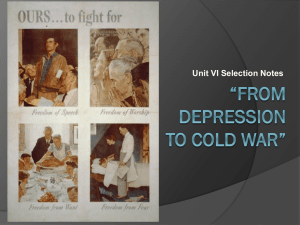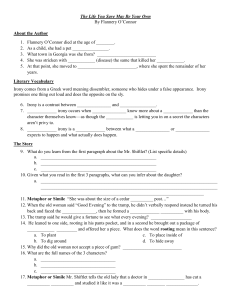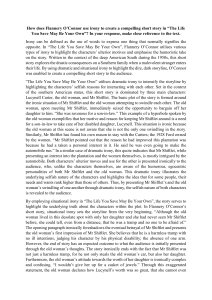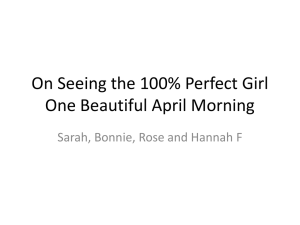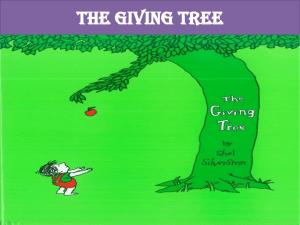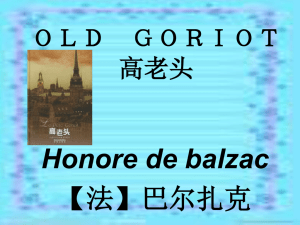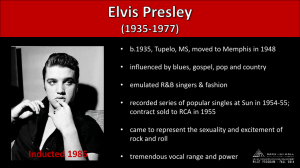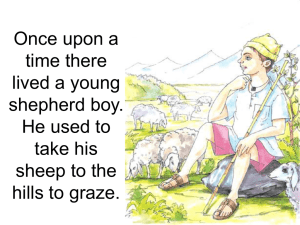O`Connor(2)
advertisement
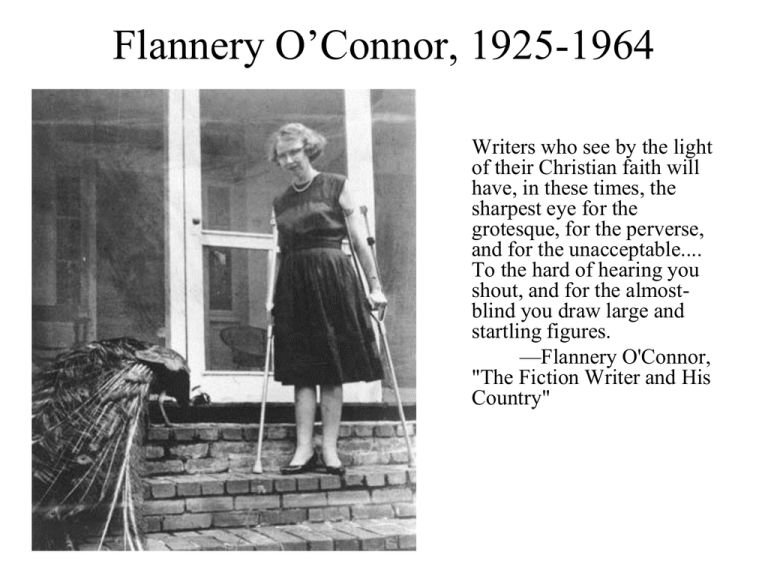
Flannery O’Connor, 1925-1964 Writers who see by the light of their Christian faith will have, in these times, the sharpest eye for the grotesque, for the perverse, and for the unacceptable.... To the hard of hearing you shout, and for the almostblind you draw large and startling figures. —Flannery O'Connor, "The Fiction Writer and His Country" The Lunatic Asylum at Milledgeville UFO finally appears, three after O’Connor’s death, 22 October, 1967 The Life You Save May Be Your Own (1955) First paragraph THE OLD WOMAN and her daughter were sitting on their porch when Mr. Shiftlet came up their road for the first time. The old woman slid to the edge of her chair and leaned forward, shading her eyes from the piercing sunset with her hand. The daughter could not see far in front of her and continued to play with her fingers. Although the old woman lived in this desolate spot with only her daughter and she had never seen Mr. Shiftlet before, she could tell, even from a distance, that he was a tramp and no one to be afraid of. His left coat sleeve was folded up to show there was only half an arm in it and his gaunt figure listed slightly to the side as if the breeze were pushing him. He had on a black town suit and a brown felt hat that was turned up in the front and down in the back and he carried a tin tool box by a handle. He came on, at an amble, up her road, his face turned toward the sun which appeared to be balancing itself on the peak of a small mountain. Georgia, 1936, Walker Evans Gene Autry in a 1957 thirty minute television production of “The Life You Save” on Schlitz Playhouse of the Stars The next day he began to tinker with the automobile and that evening he told her that if she would buy a fan belt, he would be able to make the car run. The old woman said she would give him the money. "You see that girl yonder?" she asked, pointing to Lucynell who was sitting on the floor a foot away, watching him, her eyes blue even in the dark. "If it was ever a man wanted to take her away, I would say, 'No man on earth is going to take that sweet girl of mine away from me!' but if he was to say, 'Lady, I don't want to take her away, I want her right here,' I would say, 'Mister, I don't blame you none. I wouldn't pass up a chance to live in a permanent place and get the sweetest girl in the world myself. You ain't no fool,' I would say.” "How old is she?" Mr. Shiftlet asked casually. "Fifteen, sixteen," the old woman said. The girl was nearly thirty but because of her innocence it was impossible to guess. "It would be a good idea to paint it too," Mr. Shiftlet remarked. "You don't want it to rust out." 1928 Ford There was no one in The Hot Spot but Mr. Shiftlet and the boy behind the counter, a pale youth with a greasy rag hung over his shoulder. Before he could dish up the food, she was snoring gently. "Give it to her when she wakes up," Mr. Shiftlet said. "I'll pay for it now." The boy bent over her and stared at the long pink-gold hair and the half-shut sleeping eyes. Then he looked up and stared at Mr. Shiftlet. "She looks like an angel of Gawd," he murmured. "Hitch-hiker," Mr. Shiftlet explained. "I can't wait. I got to make Tuscaloosa." The boy bent over again and very carefully touched his finger to a strand of the golden hair and Mr. Shiftlet left. "My mother was a angel of Gawd," Mr. Shiftlet said in a very strained voice. "He took her from heaven and giver to me and I left her." His eyes were instantly clouded over with a mist of tears. The car was barely moving. The boy turned angrily in the seat. "You go to the devil!" he cried. "My old woman is a flea bag and yours is a stinking pole cat!" and with that he flung the door open and jumped out with his suitcase into the ditch. Mr. Shiftlet was so shocked that for about a hundred feet he drove along slowly with the door stiff open. A cloud, the exact color of the boy's hat and shaped like a turnip, had descended over the sun, and another, worse looking, crouched behind the car. Mr. Shiftlet felt that the rottenness of the world was about to engulf him. He raised his arm and let it fall again to his breast. "Oh Lord!" he prayed. "Break forth and wash the slime from this earth!" The turnip continued slowly to descend. After a few minutes there was a guffawing peal of thunder from behind and fantastic raindrops, like tin-can tops, crashed over the rear of Mr. Shiftlet's car. Very quickly he stepped on the gas and with his stump sticking out the window he raced the galloping shower into Mobile. In Iowa, in muskrat, sheep and snow around. Andalusia, the Georgia home place near Milledgeville Letter in response to request for information from a college student doing a term paper. “Good Country People” 10 minutes, 1960’s http://www.youtube.com/watch?v=3-vyUQx5Yss “N'oubliez jamais, quand vous entendrez vanter le progrès des lumières, que la plus belle des ruses du diable est de vous persuader qu'il n'existe pas!» Charles Baudelaire, 1864 Besides the neutral expression that she wore when she was alone, Mrs. Freeman had two others, forward and reverse, that she used for all her human dealings. Her forward expression was steady and driving like the advance of a heavy truck. Her eyes never swerved to left or right but turned as the story turned as if they followed a yellow line down the center of it. She seldom used the other expression because it was not often necessary for her to retract a statement, but when she did, her face came to a complete stop, there was an almost imperceptible movement of her black eyes, during which they seemed to be receding, and then the observer would see that Mrs. Freeman, though she might stand there as real as several grain sacks thrown on top of each other, was no longer there in spirit. As for getting anything across to her when this was the case, Mrs. Hopewell had given it up. She might talk her head off. Mrs. Freeman could never be brought to admit herself wrong to any point. She would stand there and if she could be brought to say anything, it was something like, “Well, I wouldn’t of said it was and I wouldn’t of said it wasn’t” or letting her gaze range over the top kitchen shelf where there was an assortment of dusty bottles, she might remark, “I see you ain’t ate many of them figs you put up last summer.” (2529-2530) To her own mother she had said – without warning, without excuse, standing up in the middle of a meal with her face purple and her mouth half full – “Woman! Do you ever look inside? Do you ever look inside and see what you are not? God!” she had cried sinking down again and staring at her plate, “Malebranche was right: we are not our own light. We are not our own light!” Mrs. Hopewell had no idea to this day what brought that on. She had only made the remark, hoping Joy would take it in, that a smile never hurt anyone. The girl had taken the Ph.D. in philosophy and this left Mrs. Hopewell at a complete loss. You could say, “My daughter is a nurse,” or “My daughter is a school teacher,” or even, “My daughter is a chemical engineer.” You could not say, “My daughter is a philosopher.” That was something that had ended with the Greeks and Romans. All day Joy sat on her neck in a deep chair, reading. Sometimes she went for walks but she didn’t like dogs or cats or birds or flowers or nature or nice young men. She looked at nice young men as if she could smell their stupidity. (2533) “Wait,” he said. He leaned the other way and pulled the valise toward him and opened it. It had a pale blue spotted lining and there were only two Bibles in it. He took one of these out and opened the cover of it. It was hollow and contained a pocket flask of whiskey, a pack of cards, and a small blue box with printing on it. He laid these out in front of her one at a time in an evenly-spaced row, like one presenting offerings at the shrine of a goddess. He put the blue box in her hand. THIS PRODUCT TO BE USED ONLY FOR THE PREVENTION OF DISEASE, she read, and dropped it. The boy was unscrewing the top of the flask. He stopped and pointed, with a smile, to the deck of cards. It was not an ordinary deck but one with an obscene picture on the back of each card. “Take a swig,” he said, offering her the bottle first. He held it in front of her, but like one mesmerized, she did not move. Her voice when she spoke had an almost pleading sound. “Aren’t you,” she murmured, “aren’t you just good country people?” The boy cocked his head. He looked as if he were just beginning to understand that she might be trying to insult him. “Yeah,” he said, curling his lip slightly, “but it ain’t held me back none. I’m as good as you any day in the week.” “Give me my leg,” she said. He pushed it farther away with his foot. “Come on now, let’s begin to have us a good time,” he said coaxingly. “We ain’t got to know one another good yet.” easily. “Give me my leg!” she screamed and tried to lunge for it but he pushed her down Bears a resemblance to the booty, so to speak. “What’s the matter with you all of a sudden?” he asked, frowning as he screwed the top on the flask and put it quickly back inside the Bible. “You just a while ago said you didn’t believe in nothing. I thought you was some girl!” Her face was almost purple. “You’re a Christian!” she hissed. “You’re a fine Christian! You’re just like them all – say one thing and do another. You’re a perfect Christian, you’re…” The boy’s mouth was set angrily. “I hope you don’t think,” he said in a lofty indignant tone, “that I believe in that crap! I may sell Bibles but I know which end is up and I wasn’t born yesterday and I know where I’m going!” “Give me my leg!” she screeched. He jumped up so quickly that she barely saw him sweep the cards and the blue box back into the Bible and throw the Bible into the valise. She saw him grab the leg and then she saw it for an instant slanted forlornly across the inside of the suitcase with a Bible at either side of its opposite ends. He slammed the lid shut and snatched up the valise and swung it down the hole and then stepped through himself. When all of him had passed but his head, he turned and regarded her with a look that no longer had any admiration in it. “I’ve gotten a lot of interesting things,” he said. “One time I got a woman’s glass eye this way. And you needn’t to think you’ll catch me because Pointer ain’t really my name. I use a different name at every house I call at and don’t stay nowhere long. And I’ll tell you another thing, Hulga,” he said, using the name as if he didn’t think much of it, “you ain’t so smart. I been believing in nothing ever since I was born!” and then the toast-colored hat disappeared down the hole and the girl was left, sitting on the straw in the dusty sunlight. When she turned her churning face toward the opening, she saw his blue figure struggling successfully over the green speckled lake.
